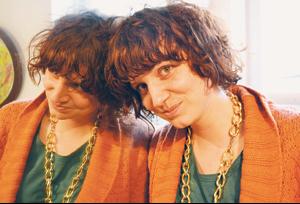Jessica Whitbread’s body is the site of her activism. She invites you to look at her, hear her story, find her sexy, see her joy and desire to fuck her.
“That’s where my activism comes from: asking the question to myself, what’s it like to be a queer woman with HIV?” she says. “I want people to be more than allies. Would you fuck an HIV-positive woman?”
For about 10 years, the bubbly organizer has lived and breathed grassroots activism. Her Fuck Positive Women initiative is charged with sexual and political energy: women with HIV are sexy, happy and have no interest in being portrayed as victims. At the same time, women are angry at being “fucked” by an oppressive, patriarchal system.
“It’s intentionally over-the-top and in people’s faces, like a performance,” she says. “It’s like, ‘You wanna eat this pussy? No? Weird!’ Because being able to sleep with whomever you want is such a privilege. People don’t even realize.”
Whitbread’s No Pants, No Problem parties are nights of playful, sexy frivolity that cater to the sexual fringes by creating safe places for all kinds of stigma-free sexual hookups.
As a member of AIDS Action Now (AAN), the 32-year-old has made herself a visible and outspoken voice for positive young queer women in an AIDS movement that she says is still male-dominated.
Whitbread was recently named the global chair of the International Community of Women Living with HIV/AIDS, the only network for positive women that’s run by women. “There are many HIV organizations that are allies of women, but they’re not led by women. It makes a difference,” she says.
In her new volunteer role, she will speak at conferences and advocate on an international stage, including at the Commission on the Status of Women conference in March, at the United Nations in New York.
“I consider this to be one of the most important roles I’ll probably play in my life,” she says. “I’m certainly a spokesperson for the movement, but I’m not interested in taking up all the space. Sometimes I get upset because I feel that I do take up a lot of space. So, I want to build and strengthen the capacity for women to take more leadership roles. We will take up space collectively.”
Whitbread found out she was HIV-positive when she was 20. She got the virus from an ex-partner, a man who would later be convicted of aggravated sexual assault. He was sentenced to five years in prison for exposing one woman and transmitting the virus to another. “Why he didn’t disclose is a mystery to me even to this day,” Whitbread said at the Day of Action to Stop HIV/AIDS Criminalization last year.
Ultimately, Whitbread doesn’t blame her former partner for her status; she blames the system. “Regardless of the reason [he didn’t disclose], I don’t believe he is a vicious murderer. He got lost in a system led by the dominant ideas about masculinity and was failed by a government that is racist, homophobic, transphobic and criminalizes sex workers and drug users.”
Two years after learning she was positive, Whitbread made her first media appearance. It was terrifying, she remembers, and she was unprepared for the way her image and message could be manipulated.
“At 22, I was a baby. I remember someone saying, ‘Where did you find this girl? She is a goldmine!’ I was this young, white woman, portrayed as this innocent victim. I didn’t want to be cloaked in that. But at the time I didn’t have the vocabulary to respond to that.”
In her new role, Whitbread wants to mobilize women to take control of their messages. She sees the global AIDS movement slowing down, rather than amping up. At AIDS conferences, more and more presentations are focusing on prevention, or even abstinence, rather than treatment and harm reduction.
Meanwhile, resources and support for HIV-positive people in Canada are being scaled back, especially for women and people of colour. Toronto’s Voices of Positive Women, a community-based agency that provided support and advocacy to HIV-positive women throughout Ontario, closed its doors in 2010 — in what Whitbread calls a devastating blow.
“The movement is really fragmented for women,” she says. “From what I’ve noticed, women with HIV are really isolated and alone. This is especially true if they don’t live in one of the city centres like Toronto, Montreal or Vancouver.”
While Whitbread encourages HIV-positive women to embrace and celebrate their sexuality, when it comes to sex, she thinks more people need to take personal responsibility for their health. “Everyone’s always at risk, all the time, for anything. I think we have a real tough time taking ownership of our own responsibility and the footprints we leave in the world.
“When I do workshops with young people, there’s a feeling that AIDS can be cured, or at least it’s no longer a death sentence. The criminalization piece is also misunderstood. They think that if someone doesn’t disclose, you can just charge them. So what’s it all matter?”
It’s why Whitbread plans to keep talking about HIV, and she’s only going to get louder. “In a movement where people burn out and fall off, I’ve just been slowly climbing the mountain.”

 Why you can trust Xtra
Why you can trust Xtra


